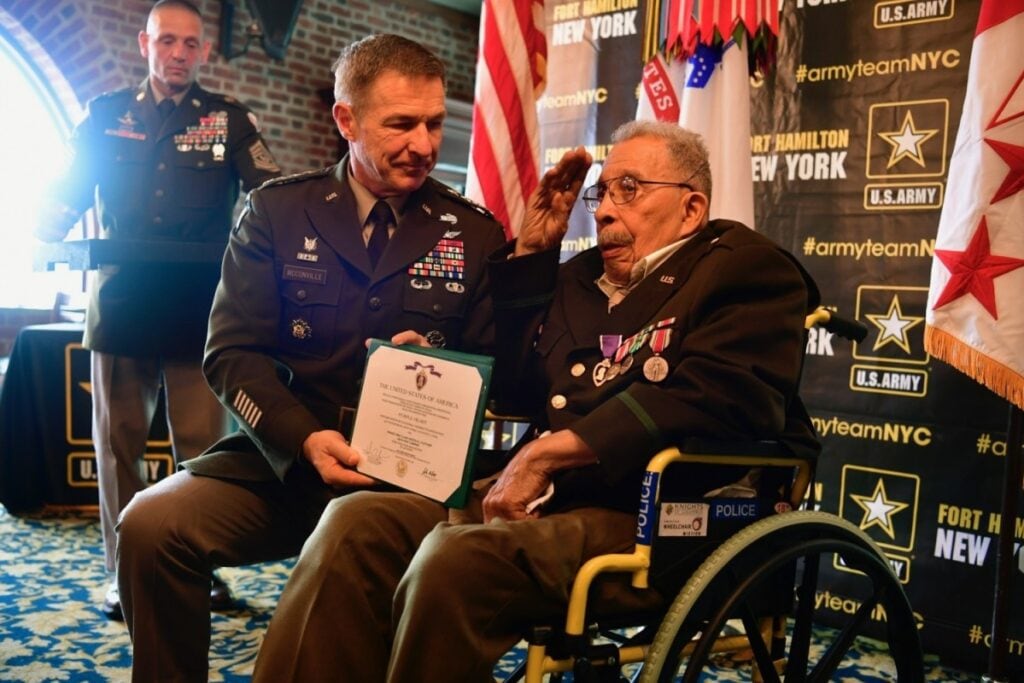Black WWII vet denied Purple Heart due to racism receives medal 77 years later
Army veteran Osceola “Ozzie” Fletcher, now 99, and an older Black vet, Johnnie Jones, were honored with long-overdue medals of honor.
Nearly 80 years after he was injured in World War II, a Black veteran was honored with a long-overdue Purple Heart medal.
U.S. Army Private Osceola “Ozzie” Fletcher was delivering supplies to Allied troops off the coast of France when he and his fellow servicemen were hit by a German missile during the Battle of Normandy. Frazier sustained an injury to the head, and the driver of the vehicle he was in was killed.
Fletcher’s wound should have earned him a Purple Heart, but he was denied it.
“The problem was that the Black soldiers were considered injured, and an injury wasn’t considered an incidence of Purple Heart,” Fletcher’s daughter, Jacqueline Streets, told CNN. “The White soldiers were considered wounded.”
The Chief of Staff of the Army, Gen. James C. McConville, presents the Purple Heart to World War II veteran and life-long New York City resident Mr. Osceola “Ozzie” Fletcher, June 18, 2021 at the Fort Hamilton Community Club here. Photo credit: Army Sgt. First Class Craig Cantrell (Amanda Hay-Caroffino)
The Purple Heart military award was established in 1782 by George Washington, who was then a general of the Army.
According to officials, the award is limited to members of the United States armed forces who, while serving under component authority in any capacity with one of the U.S. armed services after April 1917, has been wounded, killed, who has died or may hereafter die of wounds inflicted in any action against an enemy of the states.
There are many circumstances under which the medal can be administered, but injuries must require treatment by a medical doctor and be documented in the soldier’s record. But Streets said the U.S. Army had a practice of “patching up and sending back” Black soldiers.
Lt. Col. Scott Johnson, the Army Human Resources Command’s chief of awards and decorations, conducted two months of fact-finding.
“I could pull from their testimonies and multiple other sources and historical data,” said Johnson. “It was exactly like they laid out. Where they were, what they were doing, what types of munitions were being used against them, what types of weapons [were used]. It was very interesting to see these stories come together.”
In an event in Brooklyn on June 18, Fletcher, now 99 years old, received acknowledgment from Gen. James McConville, who said, “Today, we pay long-overdue tribute for the sacrifices he made to our nation and for free people everywhere.”
The Chief of Staff of the Army, Gen. James C. McConville, presents the Purple Heart to World War II veteran and life-long New York City resident Mr. Osceola “Ozzie” Fletcher, June 18, 2021 at the Fort Hamilton Community Club here. Photo boards showed Ozzie Fletcher as a police officer with NYPD and Soldier. (Amanda Hay-Caroffino)
Dressed in his full uniform, Fletcher simply remarked: “It’s about time.”
After his time in the service, Fletcher went on to become a high school teacher, a sergeant in the New York Police Department and, later, a community relations specialist in the Brooklyn district attorney’s office.
His daughter grew up hearing stories about her father’s experiences in the military. Seven years ago, she set out to get him his Purple Heart and, with the support of a group of filmmakers who created a documentary called Sixth of June, got involved and helped her.
Fletcher and another Black WWII veteran, 101-year-old Johnnie Jones of Louisiana, were finally awarded their medals of honor.
In a news release, Johnson said, “These men have the scars and stories that are hard to ignore.”
Have you subscribed to theGrio’s “Dear Culture” podcast? Download our newest episodes now!
TheGrio is now on Apple TV, Amazon Fire and Roku. Download theGrio.com today!
The post Black WWII vet denied Purple Heart due to racism receives medal 77 years later appeared first on TheGrio.

